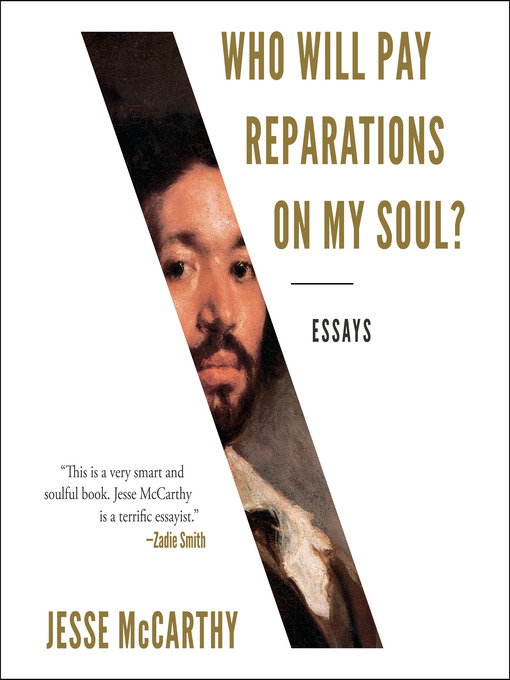Review by Choice Review
Jesse McCarthy's eclectic, riveting essays are grounded in history and leavened with popular culture. They plumb the joy and pain, the noise and silences created by defining upheavals of the 21st century--mass incarceration, wars on terror and drugs, police shootings, BLM protests, and the aggrieved violence of white redemption. With razor precision and urgency, McCarthy uses a wide lens to "pull radically different intellectual and creative strands closer together." He deploys this approach to analyze the art of Kara Walker, Glenn Ligon, Juan de Pareja, and Kehinde Wiley; contextualize the prose of James Baldwin, John Edgar Wideman, Toni Morrison, Saidiya Hartman, Ta-Nehisi Coates, and Mathias Ènard; and explore music by D'Angelo, MC Solaar, Doc Gynéco, Lil Snupe, DJ Smallz Eyes, and Da Real Gee Money. He assesses the politics of Al-Shaitat, David Walker, Unite the Right, Denmark Vesey, and Toussaint Louverture and unpacks the poetry of Ntozake Shange, Sappho, Phillis Wheatley, Claudia Rankine, the Cave Canem Collective, and the Dark Room Collective. Finally, he provides a careful exegesis of work by Fred Moten and Colson Whitehead and delivers a punishing critique of Afropessimism. McCarthy takes readers to Paris, Harlem, Atlanta, and throughout the Black Atlantic to connect trap music to white supremacy and ancient Greek poetry to the Black intellectual tradition. Summing Up: Highly recommended. Graduate students, researchers, faculty. --Lee D Baker, Duke University
Copyright American Library Association, used with permission.
Review by Publisher's Weekly Review
McCarthy, an assistant professor of English and African American Studies at Harvard, sheds light on the intersection of politics, art, and Black identity in his thought-provoking debut. "This is not a book of political essays," he writes, but rather a series of "eccentric but serious attempts to synthesize and connect different bodies of knowledge and their relationship to race or black culture." In "The Origin of Others," McCarthy surveys Toni Morrison's scholarly works, which taught "a generation of literary scholars how to read for the 'Africanist presence' in texts that otherwise pretend not to be concerned with race." "To Make a Poet Black" sees the author diving deep into Sappho's work to examine "the history of how people read certain kinds of importance into race and poetry," and the title essay poses reparations as "a moral rather than a material debt." McCarthy puts himself in conversation with such contemporary figures as Ta-Nehisi Coates (he engages with Coates's essay "The First White President" to make sense of Donald Trump's presidency and consider the role of Black intellectuals in society), and the musician D'Angelo, whose 2014 album Black Messiah McCarthy sees as "a flash of black hope in the hour of chaos." The result is an insightful collection as timely as it is original. (Mar.)
(c) Copyright PWxyz, LLC. All rights reserved
Review by Library Journal Review
A Harvard assistant professor of English and African American studies who's catching fire as a cultural critic, McCarthyexplores race, culture, identity, and politicsin a series of essays that range from Ta-Nehisi Coates's case for reparations to the impact of rap music on American culture to Velázquez as a way of understanding Kehinde Wiley's paintings. And having been raised in France, he returns from a visit to reflect on how little the Bataclan massacre seems to have affected America.
(c) Copyright Library Journals LLC, a wholly owned subsidiary of Media Source, Inc. No redistribution permitted.
Review by Kirkus Book Review
Intellectually vigorous essays on Black culture. McCarthy, who teaches in the English and African American Studies departments at Harvard, makes an impressive book debut with a collection of 20 deftly crafted essays, some previously published in journals such as n+1, the Nation, and the Point, where he is an editor. McCarthy's range is broad, encompassing writers Toni Morrison, Colson Whitehead, and Walter Benjamin; artists Jean-Michel Basquiat, Kara Walker, and French urban documentarian JR; singer/songwriter D'Angelo and cultural historian Saidiya Hartman; trap music; Frank B. Wilderson III and Afropessimism; and French society. Addressed in part "to the younger generations, struggling right now to find their footing in a deeply troubled world," McCarthy's writings on art, politics, and Black experience contribute to what he sees as "a deep yearning in our society not only for sensate, intelligent, moral reasoning, but also for the prophetic witness unique to the black radical tradition." In the title essay, the author responds to Ta-Nehisi Coates' "The Case for Reparations," which incited much debate after it appeared in the Atlantic in 2014. Reparation for racial injustice, McCarthy argues, is "a moral rather than a material debt." Although he acknowledges that Coates is justified in focusing on the wealth gap between Whites and Blacks, McCarthy takes the pragmatic view that reforms in education, sentencing, policing, and community empowerment are more achievable--and more significant. "The way to do justice to an oppressed minority is to allow it to flourish," he writes, rather than to quantify, monetize, or value humans in dollar amounts. "Reparations should be about bending the social good once again toward freedom and the good life." Having grown up in Paris, where he moved with his parents, both journalists, when he was 8, the author bears witness to "the Paris of color, of difference" that marginalizes Black immigrants. The tragic terrorist attacks at Bataclan in 2015, writes McCarthy, communicated "a desperate will to power" by those who believe verbal expression impossible. Urbane, penetrating cultural analysis. Copyright (c) Kirkus Reviews, used with permission.
Copyright (c) Kirkus Reviews, used with permission.

